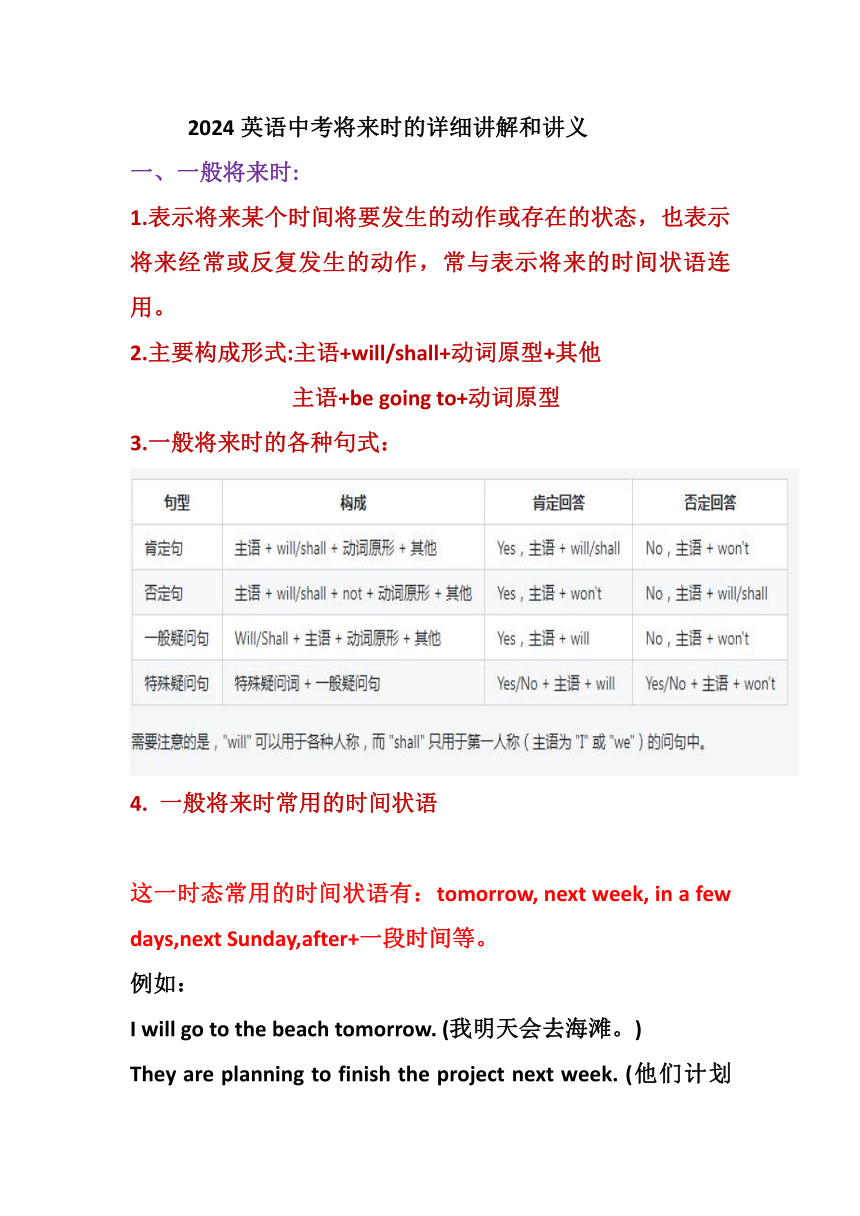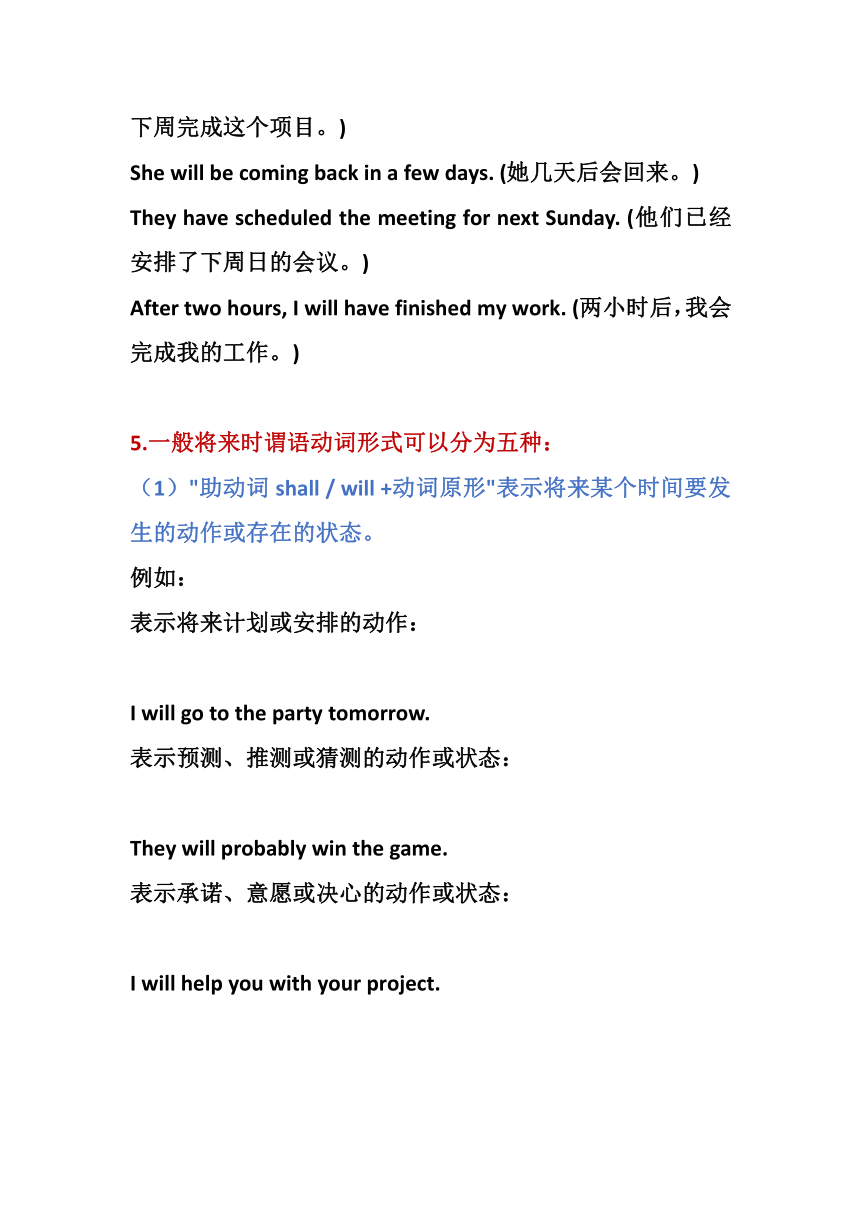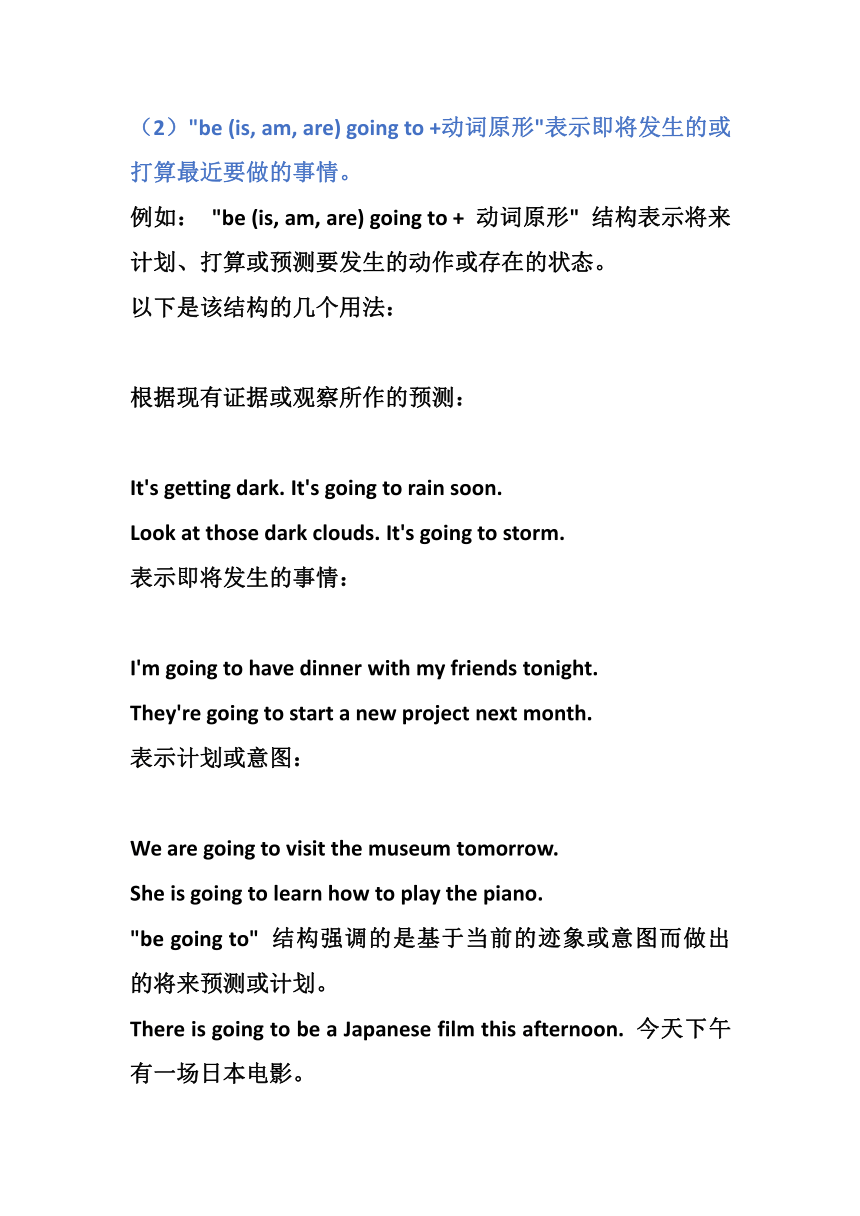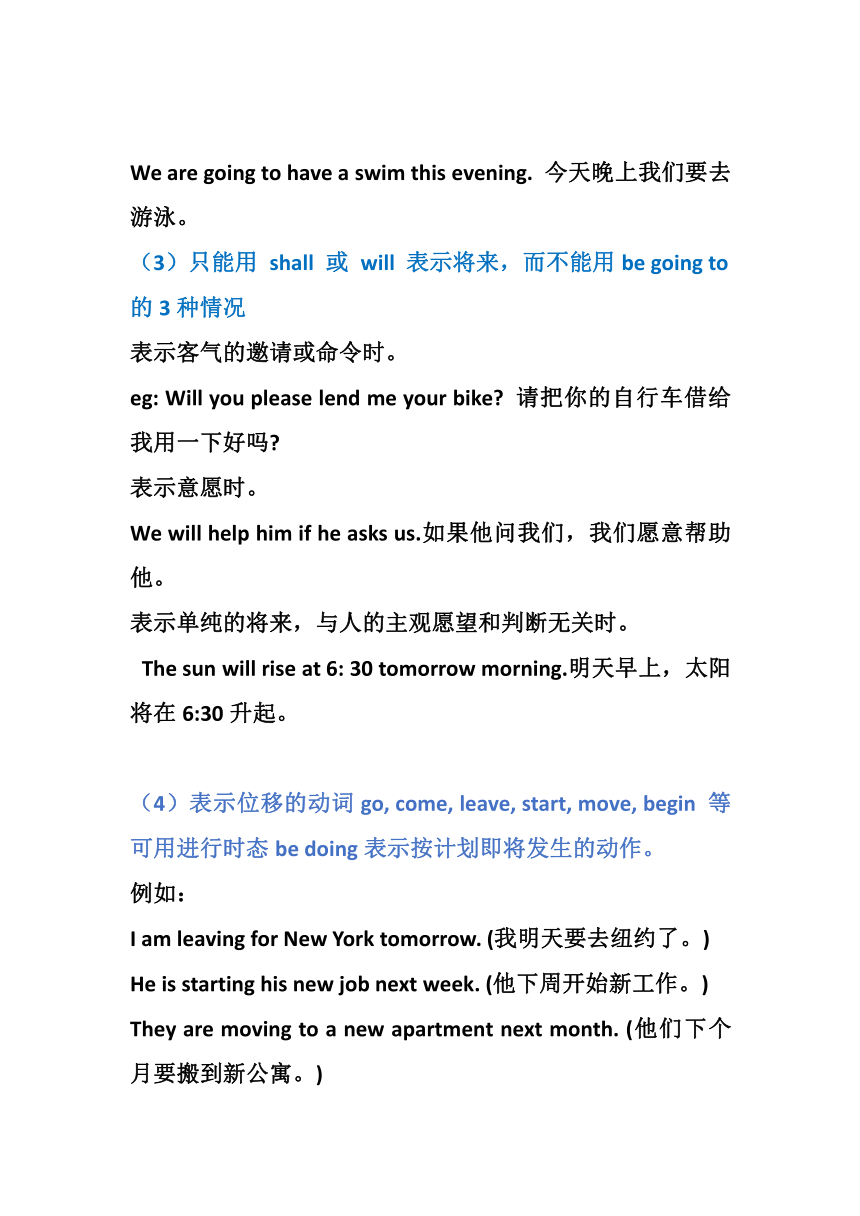2024年中考英语将来时的详细讲解和讲义
文档属性
| 名称 | 2024年中考英语将来时的详细讲解和讲义 |

|
|
| 格式 | docx | ||
| 文件大小 | 35.9KB | ||
| 资源类型 | 教案 | ||
| 版本资源 | 通用版 | ||
| 科目 | 英语 | ||
| 更新时间 | 2024-01-20 00:00:00 | ||
图片预览




文档简介
2024英语中考将来时的详细讲解和讲义
一、一般将来时:
1.表示将来某个时间将要发生的动作或存在的状态,也表示将来经常或反复发生的动作,常与表示将来的时间状语连用。
2.主要构成形式:主语+will/shall+动词原型+其他
主语+be going to+动词原型
3.一般将来时的各种句式:
4. 一般将来时常用的时间状语
这一时态常用的时间状语有:tomorrow, next week, in a few days,next Sunday,after+一段时间等。
例如:
I will go to the beach tomorrow. (我明天会去海滩。)
They are planning to finish the project next week. (他们计划下周完成这个项目。)
She will be coming back in a few days. (她几天后会回来。)
They have scheduled the meeting for next Sunday. (他们已经安排了下周日的会议。)
After two hours, I will have finished my work. (两小时后,我会完成我的工作。)
5.一般将来时谓语动词形式可以分为五种:
(1)"助动词shall / will +动词原形"表示将来某个时间要发生的动作或存在的状态。
例如:
表示将来计划或安排的动作:
I will go to the party tomorrow.
表示预测、推测或猜测的动作或状态:
They will probably win the game.
表示承诺、意愿或决心的动作或状态:
I will help you with your project.
(2)"be (is, am, are) going to +动词原形"表示即将发生的或打算最近要做的事情。
例如: "be (is, am, are) going to + 动词原形" 结构表示将来计划、打算或预测要发生的动作或存在的状态。
以下是该结构的几个用法:
根据现有证据或观察所作的预测:
It's getting dark. It's going to rain soon.
Look at those dark clouds. It's going to storm.
表示即将发生的事情:
I'm going to have dinner with my friends tonight.
They're going to start a new project next month.
表示计划或意图:
We are going to visit the museum tomorrow.
She is going to learn how to play the piano.
"be going to" 结构强调的是基于当前的迹象或意图而做出的将来预测或计划。
There is going to be a Japanese film this afternoon. 今天下午有一场日本电影。
We are going to have a swim this evening. 今天晚上我们要去游泳。
(3)只能用 shall 或 will 表示将来,而不能用be going to的3种情况
表示客气的邀请或命令时。
eg: Will you please lend me your bike 请把你的自行车借给我用一下好吗
表示意愿时。
We will help him if he asks us.如果他问我们,我们愿意帮助他。
表示单纯的将来,与人的主观愿望和判断无关时。
The sun will rise at 6: 30 tomorrow morning.明天早上,太阳将在6:30升起。
(4)表示位移的动词go, come, leave, start, move, begin 等可用进行时态be doing表示按计划即将发生的动作。
例如:
I am leaving for New York tomorrow. (我明天要去纽约了。)
He is starting his new job next week. (他下周开始新工作。)
They are moving to a new apartment next month. (他们下个月要搬到新公寓。)
Please wait for a moment. I'm coming soon. 请等一会儿,我马上就来。
(5)"be about to do和be to do+动词原形"表示按计划将要发生的事情或征求意见。
例如:
"be about to do" 表示即将要发生的动作,通常强调动作发生的紧迫感和不可避免性。例如:
I am about to leave for work. (我即将出门去上班了。)
She was about to speak when the phone rang. (她正要开口说话,电话铃响了。)
"be to do + 动词原形" 表示根据计划或安排即将要完成的动作,通常带有一定的义务或责任感。例如:
You are to finish your homework before dinner. (你需要在晚饭前完成作业。)
The meeting is to be held next Monday. (会议定于下周一举行。)
二、过去将来时:
1. 过去将来时定义:从过去的一个时间看将来发生的动作或存在的状态。
2.构成:用would should加动词原形构成,也可用was were going to加动词原形来表示
(1)would/should + 动词原形:表示过去某个时间点打算、预计或决定要做的事情。
例如:
He said he would call me later. (他说他会晚些时候给我打电话。)
We thought it should be finished by now. (我们认为现在应该完成了。)
(2)was/were going to + 动词原形:表示过去某个时间点打算、预计或决定要做的事情。例如:
I was going to go to the store, but then I remembered it was closed. (我本来打算去商店,但后来想起来它已经关门了。)
They were going to buy a new car, but then they decided to fix the old one. (他们本来想买一辆新车,但后来决定修理旧车。)
3.过去将来时的用法:常用于直接引用和宾语从句中。
直接引用:过去将来时经常用于直接引用他人过去的打算、计划或意图。例如:
She said, "I would travel around the world someday." (她说:“总有一天我会环游世界。”)
He told me that he should start a new job next month. (他告诉我,他下个月应该开始一份新工作。)
在这些例子中,过去将来时被用于引述别人过去的话语或意图。
宾语从句:过去将来时也常出现在宾语从句中,用于表达主句中过去的动词(如 said, thought, believed)所描述的过去的打算、计划或意图。例如:
She believed that she would win the competition. (她相信她会赢得比赛。)
They thought that it should be ready by now. (他们认为现在应该准备好了。)
4.过去将来时的时间标志词。
以下是一些常用的表示过去将来时的时间标志词和短语:
two days later(两天后)
The following day(第二天)
the next week(下周)
that evening(那天晚上)
这些时间标志词和短语通常与过去将来时的动作或状态相匹配,用于描述过去某个时间点之后将要发生的事件。
例如:
He said he would call me two days later.(他说他会在两天后给我打电话。)
They planned to have a meeting the following day.(他们计划第二天开会。)
She was going to travel the next week.(她打算下周去旅行。)
We decided to go to the concert that evening.(我们决定那天晚上去听音乐会。)
5. Come go leave arrive start等动词系过去、进行时可代替过去、将来时.
有些动词(如come、go、leave、arrive、start等)具有灵活的时态用法,可以用过去时或进行时来代替过去将来时的表达。
过去时代替过去将来时:
I said I would come to the party. (我说我会来参加派对。)
I said I was coming to the party. (我说我要来参加派对。)
进行时代替过去将来时:
He told me he would go on a trip. (他告诉我他会去旅行。)
He told me he was going on a trip. (他告诉我他要去旅行。)
这些动词在过去将来时的表达中,可以用过去时或进行时来替代。使用过去时或进行时的选择通常取决于说话者的意图和强调。
一、一般将来时:
1.表示将来某个时间将要发生的动作或存在的状态,也表示将来经常或反复发生的动作,常与表示将来的时间状语连用。
2.主要构成形式:主语+will/shall+动词原型+其他
主语+be going to+动词原型
3.一般将来时的各种句式:
4. 一般将来时常用的时间状语
这一时态常用的时间状语有:tomorrow, next week, in a few days,next Sunday,after+一段时间等。
例如:
I will go to the beach tomorrow. (我明天会去海滩。)
They are planning to finish the project next week. (他们计划下周完成这个项目。)
She will be coming back in a few days. (她几天后会回来。)
They have scheduled the meeting for next Sunday. (他们已经安排了下周日的会议。)
After two hours, I will have finished my work. (两小时后,我会完成我的工作。)
5.一般将来时谓语动词形式可以分为五种:
(1)"助动词shall / will +动词原形"表示将来某个时间要发生的动作或存在的状态。
例如:
表示将来计划或安排的动作:
I will go to the party tomorrow.
表示预测、推测或猜测的动作或状态:
They will probably win the game.
表示承诺、意愿或决心的动作或状态:
I will help you with your project.
(2)"be (is, am, are) going to +动词原形"表示即将发生的或打算最近要做的事情。
例如: "be (is, am, are) going to + 动词原形" 结构表示将来计划、打算或预测要发生的动作或存在的状态。
以下是该结构的几个用法:
根据现有证据或观察所作的预测:
It's getting dark. It's going to rain soon.
Look at those dark clouds. It's going to storm.
表示即将发生的事情:
I'm going to have dinner with my friends tonight.
They're going to start a new project next month.
表示计划或意图:
We are going to visit the museum tomorrow.
She is going to learn how to play the piano.
"be going to" 结构强调的是基于当前的迹象或意图而做出的将来预测或计划。
There is going to be a Japanese film this afternoon. 今天下午有一场日本电影。
We are going to have a swim this evening. 今天晚上我们要去游泳。
(3)只能用 shall 或 will 表示将来,而不能用be going to的3种情况
表示客气的邀请或命令时。
eg: Will you please lend me your bike 请把你的自行车借给我用一下好吗
表示意愿时。
We will help him if he asks us.如果他问我们,我们愿意帮助他。
表示单纯的将来,与人的主观愿望和判断无关时。
The sun will rise at 6: 30 tomorrow morning.明天早上,太阳将在6:30升起。
(4)表示位移的动词go, come, leave, start, move, begin 等可用进行时态be doing表示按计划即将发生的动作。
例如:
I am leaving for New York tomorrow. (我明天要去纽约了。)
He is starting his new job next week. (他下周开始新工作。)
They are moving to a new apartment next month. (他们下个月要搬到新公寓。)
Please wait for a moment. I'm coming soon. 请等一会儿,我马上就来。
(5)"be about to do和be to do+动词原形"表示按计划将要发生的事情或征求意见。
例如:
"be about to do" 表示即将要发生的动作,通常强调动作发生的紧迫感和不可避免性。例如:
I am about to leave for work. (我即将出门去上班了。)
She was about to speak when the phone rang. (她正要开口说话,电话铃响了。)
"be to do + 动词原形" 表示根据计划或安排即将要完成的动作,通常带有一定的义务或责任感。例如:
You are to finish your homework before dinner. (你需要在晚饭前完成作业。)
The meeting is to be held next Monday. (会议定于下周一举行。)
二、过去将来时:
1. 过去将来时定义:从过去的一个时间看将来发生的动作或存在的状态。
2.构成:用would should加动词原形构成,也可用was were going to加动词原形来表示
(1)would/should + 动词原形:表示过去某个时间点打算、预计或决定要做的事情。
例如:
He said he would call me later. (他说他会晚些时候给我打电话。)
We thought it should be finished by now. (我们认为现在应该完成了。)
(2)was/were going to + 动词原形:表示过去某个时间点打算、预计或决定要做的事情。例如:
I was going to go to the store, but then I remembered it was closed. (我本来打算去商店,但后来想起来它已经关门了。)
They were going to buy a new car, but then they decided to fix the old one. (他们本来想买一辆新车,但后来决定修理旧车。)
3.过去将来时的用法:常用于直接引用和宾语从句中。
直接引用:过去将来时经常用于直接引用他人过去的打算、计划或意图。例如:
She said, "I would travel around the world someday." (她说:“总有一天我会环游世界。”)
He told me that he should start a new job next month. (他告诉我,他下个月应该开始一份新工作。)
在这些例子中,过去将来时被用于引述别人过去的话语或意图。
宾语从句:过去将来时也常出现在宾语从句中,用于表达主句中过去的动词(如 said, thought, believed)所描述的过去的打算、计划或意图。例如:
She believed that she would win the competition. (她相信她会赢得比赛。)
They thought that it should be ready by now. (他们认为现在应该准备好了。)
4.过去将来时的时间标志词。
以下是一些常用的表示过去将来时的时间标志词和短语:
two days later(两天后)
The following day(第二天)
the next week(下周)
that evening(那天晚上)
这些时间标志词和短语通常与过去将来时的动作或状态相匹配,用于描述过去某个时间点之后将要发生的事件。
例如:
He said he would call me two days later.(他说他会在两天后给我打电话。)
They planned to have a meeting the following day.(他们计划第二天开会。)
She was going to travel the next week.(她打算下周去旅行。)
We decided to go to the concert that evening.(我们决定那天晚上去听音乐会。)
5. Come go leave arrive start等动词系过去、进行时可代替过去、将来时.
有些动词(如come、go、leave、arrive、start等)具有灵活的时态用法,可以用过去时或进行时来代替过去将来时的表达。
过去时代替过去将来时:
I said I would come to the party. (我说我会来参加派对。)
I said I was coming to the party. (我说我要来参加派对。)
进行时代替过去将来时:
He told me he would go on a trip. (他告诉我他会去旅行。)
He told me he was going on a trip. (他告诉我他要去旅行。)
这些动词在过去将来时的表达中,可以用过去时或进行时来替代。使用过去时或进行时的选择通常取决于说话者的意图和强调。
同课章节目录
- 词法
- 名词
- 动词和动词短语
- 动词语态
- 动词时态
- 助动词和情态动词
- 非谓语动词
- 冠词
- 代词
- 数词和量词
- 形容词副词及其比较等级
- 介词和介词短语
- 连词和感叹词
- 构词法
- 相似、相近词比较
- 句法
- 陈述句
- 一般疑问句和否定疑问句
- 特殊疑问句及选择疑问句
- 反意疑问句
- 存在句(There be句型)
- 宾语从句
- 定语从句
- 状语从句
- 主谓一致问题
- 简单句
- 并列句
- 复合句
- 主谓一致
- 主、表语从句
- 名词性从句
- 直接引语和间接引语
- 虚拟语气
- 感叹句
- 强调句
- 倒装句
- 祈使句
- 句子的成分
- 句子的分类
- 题型专区
- 单项选择部分
- 易错题
- 完形填空
- 阅读理解
- 词汇练习
- 听说训练
- 句型转换
- 补全对话
- 短文改错
- 翻译
- 书面表达
- 任务型阅读
- 语法填空
- 其他资料
